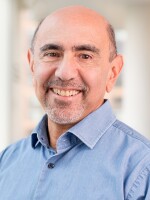Thirty years ago Friday, a shocking announcement was made in the rotunda of San Francisco's City Hall by a visibly shaken Dianne Feinstein, who was then president of the city's Board of Supervisors.
"Both Mayor Moscone and Supervisor Harvey Milk have been shot and killed," Feinstein said.
The crowd of reporters erupted in gasps. Someone yelled, "Jesus Christ!"
No One Could Have Imagined
The murders of Mayor George Moscone and city Supervisor Harvey Milk changed the course of San Francisco politics and have inspired a new movie. The legacy of that day runs deep.
San Francisco was already on edge over news the previous week that members of the People's Temple, led by the Rev. Jim Jones, had committed mass suicides in Jonestown, Guyana. Jones' cult was based in the Bay Area. And many of the 900 people who died in Jonestown were San Franciscans.
But no one could have imagined the tragedy that was about to unfold at City Hall.
Moscone, the most liberal mayor in the city's history, was gunned down in his private office. On the other side of City Hall, Milk, San Francisco's first openly gay elected official, was also murdered. The killer was someone everyone knew.
"Suspect is Dan White, considered armed and dangerous," was the word that went out in a police radio call.
Cultures Clash In A City
Dan White wasn't just another crazy man with a gun. At 32, he was a Vietnam veteran and former cop who had become one of San Francisco's youngest elected officials. On the Board of Supervisors, White represented a working-class district where many residents felt under siege by the rising power of women, minorities and gays.
White wasn't made for politics — especially the new kind, says author Mike Weiss, who wrote a book about the Moscone-Milk killings.
"He was incredibly naive. This, to me, is at the root of the tragedy," Weiss said. "He knew nothing about politics. He was defeated in City Hall again and again. And the engine of his defeat was George Moscone and Harvey Milk and their allies in the liberal wing of the Democratic Party."
That liberal wing was an emerging power because the city had just changed to a district election system. District constituents voted Milk into office. They also elected the city's first Chinese-American and its first African-American woman to the Board of Supervisors.
Out of sync with City Hall, White was frustrated. After less than a year in office, he abruptly resigned, saying he couldn't support his family on a supervisor's part-time salary. He changed his mind after being pressured by downtown business interests that didn't want to lose a conservative voice on the board. White urged Moscone to give him his old job back. At first, Moscone said he would — then the mayor had second thoughts.
"Dan White's resignation was a gift politically to George Moscone," said Judge Quentin Kopp, who served on the board with White. "Because now he could replace him with someone nobody had heard of but would be a sure-thing vote for George Moscone. And that gave him six votes out of 11 on the Board of Supervisors."
A Killer's Unusual Path
On Nov. 27, 1978, White knew Moscone was about to appoint someone else. That morning, he carried a snub-nose .38-caliber pistol and crawled through a basement window at City Hall to avoid metal detectors. He confronted Moscone in his office and shot him four times.
White then crossed City Hall to Milk's office — he believed Milk was involved in a conspiracy to keep him off the board.
As White walked past, he was spotted by Feinstein.
"And I said, 'Dan,' and he didn't stop," Feinstein said in a 1983 documentary produced by KQED-TV.
Feinstein said she saw White pass her office but was unaware that he had just shot Moscone.
"And he went two offices down," Feinstein said. "I heard the door close, and then I heard the shots. I was the first one into the office where Harvey Milk was on his stomach on the floor. I knew that he was dead."
The 'Twinkie Defense'
White was soon in police custody. But the real drama came during his trial. White's attorney said his client suffered from diminished capacity due to depression. The defense pointed to White's steady diet of junk food. The press dubbed it the "Twinkie defense."
The prosecution, believing it had an open-and-shut case, played a tape of White's confession. Crying on the tape, White talked of pressures and feeling troubled because his wife had to work.
But the prosecution's strategy backfired. The confession won the jury's sympathy, and they found White guilty of voluntary manslaughter — not murder.
Hearing the decision, San Francisco's gay community exploded in anger and marched in what's known as the White Night Riot.
Despite the outrage, White served just five years in prison; two years after he was released, he killed himself.
But his actions traumatized the city and its politics. Moscone's liberal policies took a back seat, and district elections were dismantled.
Feinstein emerged as a political star. She had already run for mayor twice and lost. But after Moscone's murder, she inherited the mayor's chair and led the city in a more conservative direction — including favoring downtown business interests. She was credited with calm leadership throughout the city's tragedy.
A Reminder In City Hall
Today, the entrance to the San Francisco mayor's office is flanked by busts of Feinstein and Moscone.
"So it's impossible to go to work, it's impossible to do your job, without being reminded of the tragedy of 30 years ago," said the city's current mayor, Gavin Newsom.
Newsom was just 11 back in 1978. But the office that is now his looks the same today as it did three decades ago.
The door is the "same door that Dan White walked into, same door in the back that Dan White walked out of after gunning down and assassinating Mayor Moscone — literally just a few feet away from where we're standing," Newsom says.
He sees some parallels to those days. Some 30 years ago, Milk led the successful fight against Proposition 6, a measure that would have barred gays from teaching in California schools. That dispute reminds Newsom of his current fight — against the newly passed Proposition 8, which denies same-sex couples the right to marry. Voters approved the measure earlier this month.
"There's been a lot of advancements, but we're still not there," Newsom said. "And I think it's pretty damning that 30 years later, we would be still talking about full equality for the gay and lesbian community."
Other San Franciscans are likely to think about how much their city has changed as the new movie Milk opens this week.
There is no question that the gay community was ultimately energized by the supervisor's death. But with the spotlight on Milk's legacy, author Weiss worries that history may have forgotten Moscone.
"Harvey Milk was victimized and became a martyr for a cause," Weiss said. "He's been remembered and appropriately so — he was a pioneering politician. And you know, mayors just aren't known outside their own cities. So George has about what mayors get: He has a convention center and a playground named after him."
Weiss said he hopes that Moscone is also remembered as a mayor who embraced diversity at a time when it was unconventional — even though it's something that, today, many San Franciscans take for granted.
Copyright 2022 NPR. To see more, visit https://www.npr.org. 9(MDAzMjM2NDYzMDEyMzc1Njk5NjAxNzY3OQ001))







